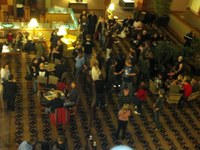Theory and Hypothesis of the Role-playing Gamer "Floater"
My working hypothesis has two parts, one, that the now inculcated social assumption about role-playing gamers and gaming drives away more "normal" people from the hobby and attracts the stereotypes because people are increasingly buying into the media and apocryphal stories the longer they are reinforced. The second half is because the gamers that fit the stereotypes are the rejects from the regular groups.
The "mature", "normal" players are already in their groups, that typically stick together for years, even decades. Generally the make up of the group only changing when people move and such. Then there is the percentage of role-playing gamer "floaters" that get kicked from group to group because of their various dysfunctions. These are the gamers that are most often seen in public as they go to pick up games at comic book stores, hobby stores, conventions, and new-member invites. Since they are so dysfunctional, they keep getting kicked out after a few sessions, and being the cycle again.
Meanwhile the "normal" gamers are happily meeting regularly at home or in closed game rooms, and most of the public never see the "normal" players, and instead generally just see the dysfunctional floaters.
Though occasionally some of the players I gamed with in the 70's, 80's, and 90's fit the stereotypes, MOST of those I gamed with were successful, well-adjusted, functional people, with none of the anti-social and dysfunctional aspects claimed about role-playing gamer stereotypes.
The research done on role-playing gamers (correlative and meta studies) shows the stereotypes generally disproved.
Most of the gamers I gamed with regularly didn't have any more trouble getting dates, girlfriends, wives/husbands, etc. than anyone else. They were from all walks of life and interests, and over the years most of them were professionally successful.
There are very few gamers I have gamed with (once they are adults) long enough to get to know more about their personal lives, that fit the dysfunctional, anti-social, unemployed, living in their parents basement stereotype.
Though everyone has various foibles and challenges, most of them did not map to the stereotypes any more strongly than other groups (non-gamers). That being said during about that time period, more recently about half of the gamers I have met since about 2004 to current have been fitting the stereotypes. I have had to move a few times over the years when I was building my professional career, including Utah, California, Oklahoma, Idaho, Washington, and elsewhere, and as I moved it took a while to put new groups together.
When I moved to Spokane, Washington, I began seeing a LOT of the stereotypical gamers. At first I thought it might be an issue with Spokane (I haven't completely ruled that out yet), but as I have gone to Seattle and elsewhere, I developed the aforementioned alternative hypotheses.
What do you think of these ideas?
Whatever ideas I have for developing testable hypotheses run into the problem of self-selection and selection. With enough funding it is theoretically possible to find a sample of people that do not go to conventions or books stores or public gaming venues but do game with friends, through random polling and selection datagbase services like InfoCo USA. But a lot of money would be needed to find a large enough sample size to make it testable. Once these non-prominent gamers were found, they would need to be wiling to undergo a battery of psych, demograhpics, and other assessments, and then compare and contrastd those with those in the "floater" category, vs. those just in public gaming venues and public sys, versus the general non-gaming public. So, this could be done, but would need real money and resources to make into an actual testable hypothesis:
Document Actions

